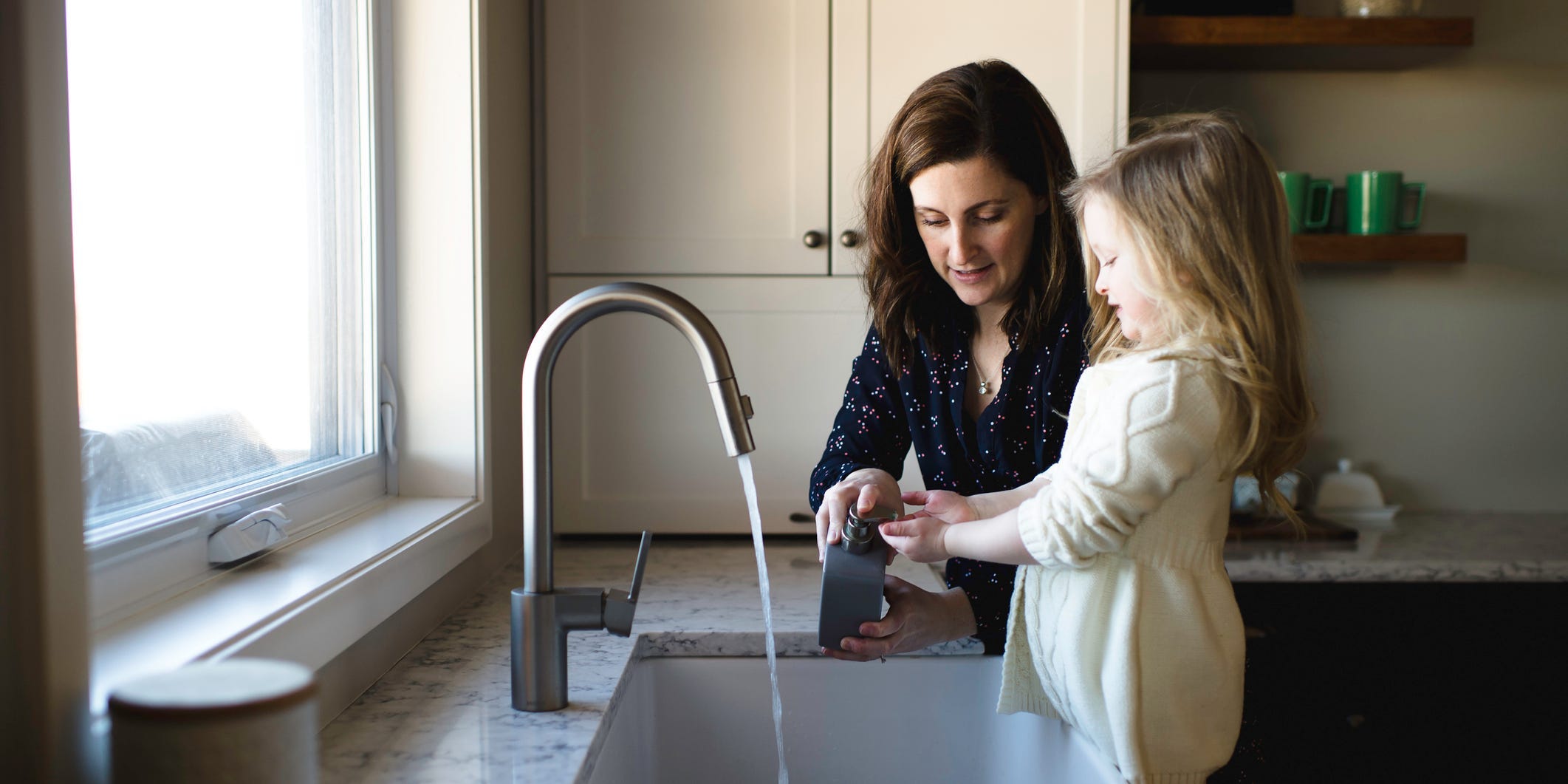
Erin Lester/Getty Images
- Personal hygiene is important, as maintaining a healthy routine will reduce your chance of falling sick with a bacterial or viral infection.
- The different types of personal hygiene include hand and nail hygiene, dental hygiene, body hygiene, and sexual hygiene.
- For the best results, you should stick to a daily personal hygiene routine, and teach your kids how to incorporate hygienic behaviors into their life at a young age.
- This article was medically reviewed by Jason R. McKnight, MD, MS, a family medicine physician and clinical assistant professor at Texas A&M College of Medicine.
- Visit Insider’s Health Reference library for more advice.
Personal hygiene is the process of promoting your health by washing and caring for your body. Maintaining strong personal hygiene is especially important for disease prevention, according to the Centers for Disease Control and Prevention (CDC).
If you have poor personal hygiene, it can impact your physical, mental, and emotional health. Here’s how you can build a healthy personal hygiene routine for yourself and your loved ones.
Types of personal hygiene
By practicing good hygiene, you improve your cleanliness, which can keep disease-causing bacteria and viruses at bay, reducing your likelihood of getting sick.
Here are some of the most important types of personal hygiene:
Hand and nail hygiene
According to the CDC, washing your hands regularly is one of the most effective ways to stop the spread of viruses and infection. If your hands have germs on them, the germs can enter your body when you touch your face, which we all do frequently.
Because of this, the CDC recommends washing your hands regularly, and particularly:
- Before eating
- After being in a public place
- After using the bathroom or changing a diaper
- After touching a wound, garbage, or an animal
Scrub your hands for at least 20 seconds, and use hand sanitizer only when soap isn't available. That's because hand sanitizer kills germs, but does not remove germs and dirt from your hands. Make sure that the area under your fingernails is clean from dirt and debris.
Dental hygiene
Caring for your mouth and teeth is also important. This can prevent bad breath, gum disease, and tooth decay. Since tooth decay may be linked to other diseases, including heart disease, having strong dental or oral hygiene can contribute to overall health.
"Poor dental hygiene can lead to oral infection that can ultimately lead to infection of the heart valves (endocarditis) or brain (brain abscess), either of which can be fatal," says Charles Bailey, MD, medical director for infection prevention at St. Joseph Hospital and Mission Hospital in California.
The American Dental Association recommends brushing your teeth twice a day for two minutes, using a toothpaste that contains fluoride. You should also floss once a day and see a dentist every six months.
Body hygiene
Overall, it's important to keep your body clean to prevent skin conditions and infections, Bailey says. He recommends that adults shower daily and wash their hair at least once a week. Pay particularly close attention to cleansing your face with soap and water, and washing near your eyes and ears. Another part of keeping your body hygienic is ensuring that your clothes are clean.
"Chronic skin conditions can arise from infrequent bathing or failure to change clothes when soiled or worn for extended periods," Bailey says. Most people with adequate access to clean water and washing facilities should change their clothes daily and wash them before re-wearing, he recommends.
Sexual hygiene
Bailey also deems practicing safe sex an important part of personal hygiene. Using a barrier method like a condom or dental dam (for oral sex), and getting tested for STIs regularly is part of good overall hygiene, he says. Without practicing safe sex, you can be exposed to STIs that can have a lasting impact on your general health.
How to create a healthy personal hygiene routine
It's never too late to develop healthy habits, and strengthening your personal hygiene routine can make a big difference when it comes to your physical and mental health.
"These practices reduce the risk of disease spread or preventable physical decline or impairment," Bailey says. "They promote social acceptance, thus positively impacting mental health."
Use lists or ask a trusted loved one to make sure that you:
- Shower daily
- Brush your teeth twice a day and floss once per day
- Have appropriate personal toiletries including soap, shampoo, deodorant, and a fluoride toothpaste
Personal hygiene for kids
Ideally, Bailey says having a good personal hygiene routine will start in childhood. In fact, the American Academy of Pediatrics has stressed the need to teach kids about personal hygiene as a way to curb the spread of infectious diseases.
"These personal hygiene practices can be adopted as one would any new desired behavior: by repetition and constant reminders of the importance of the desired new habit," Bailey says.
Bailey recommends parents take the following steps to teach kids about personal hygiene:
- Model proper hygiene yourself. If you don't do it, your kids probably won't do it.
- Explain why hygiene is important. You can talk about why you take time to brush your teeth, shower and change clothes.
- Repeat and remind your kids as needed. Try using sticky notes or a reward system.
It's also important to practice and teach hygiene etiquette in order to stop the spread of diseases. For example, teaching your kids to cover their coughs and sneezes, and modeling it yourself, is a basic form of hygiene etiquette and can go a long way to curb illness.
Takeaways
Having good personal hygiene is important for physical and mental health, and it is one major factor towards helping you live your best life.
"Along with other decisions like nutrition, exercise, and avoidance of tobacco and alcohol products, they encompass the non-heritable factors that will determine your lifelong health and ultimately your longevity," Bailey says.
Related stories from Health Reference:
- The best hand soap
- The best hand sanitizer
- The best disinfecting cleaners
- Does hand sanitizer work? The difference between sanitizer and soap
- How do viruses spread and how to protect yourself against infection
Dit artikel is oorspronkelijk verschenen op z24.nl










